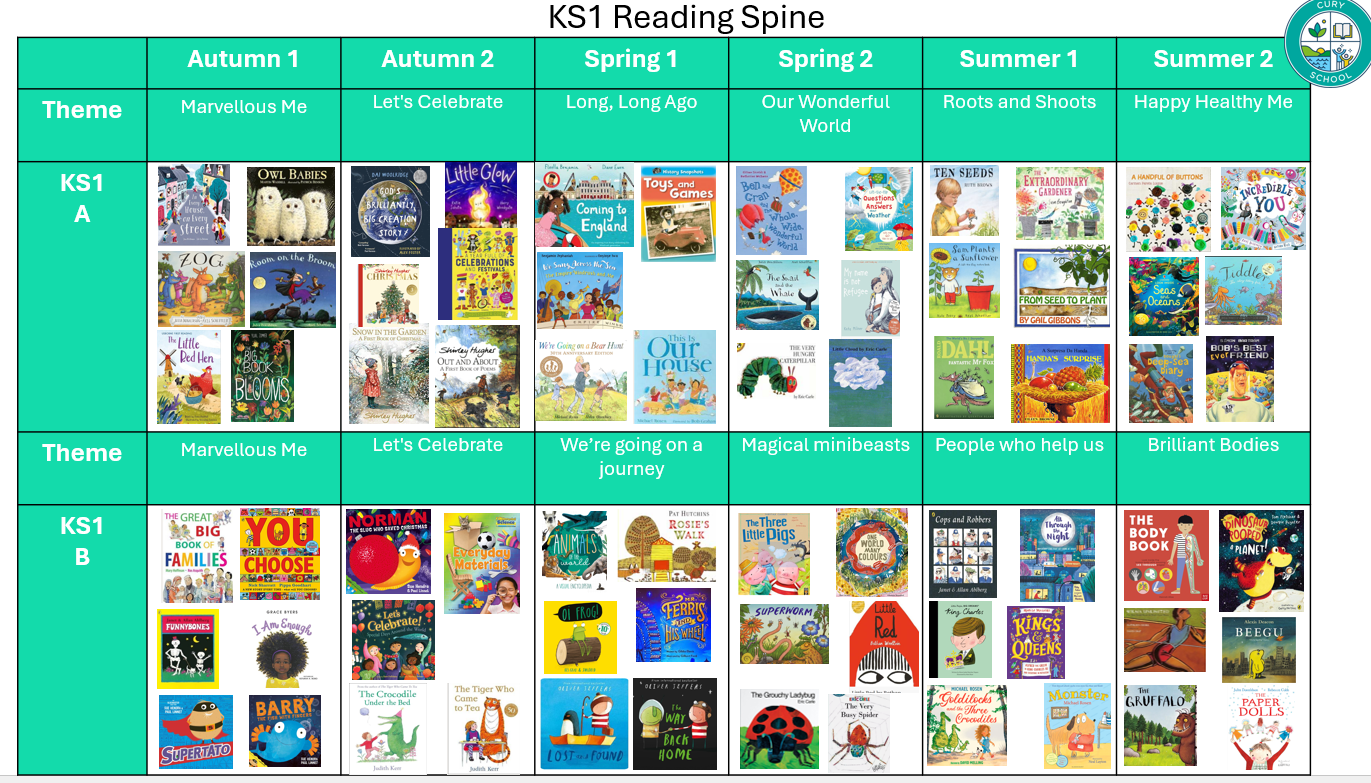Reading and Phonics
INTENT
At Cury School, we value reading as a key life-skill and are dedicated to enabling our pupils to become lifelong, confident readers. We believe reading is key for all academic success and know that using a strong systematic synthetic phonics program will support every one of our pupils to become confident and fluent readers. We believe that phonics provides the foundations of learning to enable every child to effectively learn to read. We want all pupils to begin their journey to read with confidence, develop a love of reading and apply their skills competently to writing.
We use Read Write Inc (RWI) as our SS Program, as we believe the consistency, rigour and clear routine and structure fully support our learners. Through high quality teaching of RWI at Cury School, children will learn to decode letter-sound correspondences, segment words to spell and blend sounds to read quickly and effortlessly. They become confident and fluent readers who enjoy reading and can comprehend the texts they read.
We passionately believe that teaching children to read is a fundamental skill that not only holds the keys to the rest of the curriculum and every child’s future learning, but also has a huge impact on children’s self-esteem and future life chances.
At Cury School we are determined that every pupil will learn to read, regardless of their background, needs or abilities. Many of our students may have missed out on learning to read. If children are not confident readers when joining our school, we use RWI as our approach.
RWI is designed to be inclusive for all children, whatever their need. Our regular phonic assessments quickly identify those children who need further support and enable us to direct the exact content they need to make progress. This means all children are always taught at their individual challenge point to ensure they make the best progress, and all children learn to read at our school.
At Cury School it is our aim that:
- All children develop a love of reading. They enjoy and engage with reading regularly in many different contexts and environments.
- All children will be exposed to a wide range of high-quality, fantastic texts during their time at our school. We use a book spine that includes a progressive and diverse range of stories, poems, rhymes and non-fiction texts which are chosen to develop pupils’ vocabulary, language comprehension and love of reading.
- Adults will read daily to every child as texts form a core part of our wider curriculum offer. Adults use an approach of ‘Talk through stories’ which is designed to extend and deepen children's vocabulary in story-time sessions.
- All children will become familiar with a range of focus authors in each year group and enjoy becoming authors themselves.
- Any child that is not working at an age-related level or making good progress will receive additional support.
- Through high quality reading teaching, all children will be able to read common-exception words on sight, be able to decode unfamiliar words, understand what they read and be able to read with fluency, enjoyment and expression.
All children will be given opportunities to apply their reading skills throughout the curriculum.
IMPLEMENTATION
To implement phonics instruction effectively for pupils, we use the Read Write Inc Program to ensure that all learners receive a high-quality, individualised education that is aligned with their unique needs and abilities.
Key strategies for our implementation include:
1. Differentiation: We tailor the RWI Program to the specific needs of our students, ensuring that lessons are accessible and challenging at the appropriate level. This includes providing additional resources, scaffolding, communication resources and breaking down tasks into smaller steps to support individual progress.
2. Consistent approach & commitment to staff training and development: We ensure that our phonics training is successful by implementing whole school training and CPD at staff INSETs, staff meetings and ensuring all staff have access to training materials. in new staff transition packs to guarantee confidence and consistency with delivery. Our RWI lead is very experienced with leading the program and supports staff regularly through coaching and training to ensure all staff are supported to become excellent reading teachers.
3. Multisensory Learning: The program includes visual, auditory, and kinaesthetic methods of delivery to ensure learning is accessible for all our learners.
4. Small Group/1:1 Support: Many of our pupils receive targeted 1-2-1 individualised teaching for their reading or phonics lessons, but some are in small-group sessions. Each session is structured to provide focused phonics or progressive reading skills at a pace that suits each child’s progress. The teaching is carefully matched to the learner’s developmental level.
5. Additional practice: Pupils that are identified as requiring further support are identified to receive further phonics and reading intervention.
6. Reading Books matched to the phonics program stage and individual levels of development: Pupils who are accessing the phonics program use matching Book Bag RWI books which ensure they only read books matched to the sounds they know. Teachers can assign students to the eReader version of the text they are reading in addition to a hard copy. Children that have completed the phonics program access texts at their appropriate level to challenge and engage.
7. Motivation and enjoyment: We use fun apps and additional online eBooks to support further enjoyment, development and engagement in reading. We use apps such as ‘Reading Eggs’ and ‘Teach your Monster to Read’ to support reading enjoyment and engagement. Our online resources have access to over 5000 e-books which are aligned to phonics and reading levels that students can access in class or at home.
8. Progress Monitoring and Assessment: Regular formative assessments using Phonics assessment trackers and ongoing observations help track the progress of our students on the phonics program. Learners are assessed each half term to ensure any barriers to progress are addressed and that they are assigned to the correct compatible group and stage of the program. Adjustments will be made to ensure that each pupil’s phonics skills are developing effectively and in accordance with their learning profile.
10. Parental Involvement: Engaging parents in the phonics learning process and our reading strategies through home learning resources, workshops, community events and communication.
11. High priority regular daily teaching: We teach phonics/reading lessons daily and reading lessons are always a priority with high expectations of engagement. When learners are past phonics support, we have targeted group or individual reading sessions which include fluency, language and comprehension development.
12. Reading Areas: At Cury School, we want all our children to love books. We have special reading areas in every classroom. Books in the reading corners are easy to find and make the books look attractive to read, with importance placed on ‘refreshing’ the displays to ‘highlight topics, titles or authors.’
13. Student Voice; Children help to select new books for our library and for choosing class readers for guided reading and topic ideas. They share parts of books they have enjoyed and suggest books to promote to their peers.
14 Celebrate Reading; The children see that staff are enthused readers and enjoy texts when they read to children. We celebrate reading at every opportunity with collapsed curriculum days for various events such as World Book Day, National Story Telling Day, The Shakespeare Festival and Roald Dahl Day. We also invite local authors and visitors to come in and share books and join us to celebrate the love of reading.
15. Reading Spine: We recognise that the skill of reading is fundamental to every-day life. We give reading the highest priority throughout our curriculum and our school day. To reflect our commitment to reading, we have based our Cury curriculum on a comprehensive reading spine upon which our wider curriculum topics are built. Our Reading Spine contains a range of high quality, diverse and vocabulary rich texts that children encounter during their time with us. We have identified 4-6 key high-quality core texts for each year group for each half-term topic taught. The texts are made up of a range of text types, including fiction, non-fiction and poetry. Teachers use these in a range of ways; as repeated whole-class texts to share, as part of their literacy lessons, when learning about focus authors and to enhance and make connections between our topics. We have ensured that the texts we have chosen are engaging and encourage enjoyment of reading. Books have been selected to ensure they include a range of titles that explore and support the teaching of equality and diversity.



IMPACT
The implementation of the Read Write Inc Program and high-quality reading provision will have a positive impact on the reading skills and reading development of all our pupils at Cury School.
Will believe our reading provision will ensure the following impact:
• Pupils will have increased Confidence: students will demonstrate greater confidence in their ability to decode and recognise words, leading to improved engagement in reading activities. They will further develop confidence through building their skills of fluency and comprehension.
• Pupils will develop improved Phonics Skills: Pupils will learn to blend and segment sounds, resulting in increased reading fluency. Regular assessment data of children on the phonics program will indicate rates of progression and identify children who require further support.
• Pupils will develop enhanced reading enjoyment: The priority we place on reading in our school, our reading events, daily story time, engaging reading lessons and beautiful reading areas will foster a positive attitude toward reading with all staff and pupils. We believe this will encourage learners to have a greater enthusiasm for reading and exploring texts independently and together.
• Pupils will feel part of an inclusive Learning Environment; Our approach to reading will ensure every child makes progress in our school. The differentiated and supportive nature of our phonics and reading lesson instruction will ensure that every child, regardless of their SEND or learning need, will feel included in the learning process.
• Pupils will sustain progress: Our students will make progress towards their individual reading goals. We are confident that these gains will continue as we maintain a consistent, individualised approach to phonics and reading teaching and ensure regular assessments inform quality teaching at the correct stage for all children.







